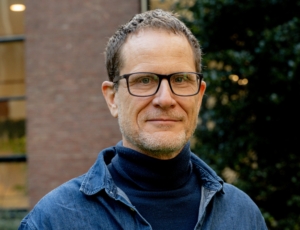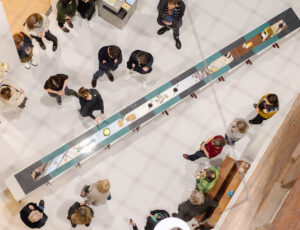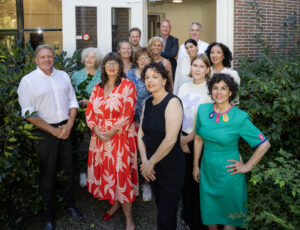“We are going to share some insider information with you that cannot leave this room,” Oscar Gelderblom announced at the beginning of the launch of their Game of the Golden Age. Oscar and his colleague and fellow economic historian from Utrecht University, Joost Jonker, developed a serious game on the basis of their research into the evolution of seventeenth-century financial markets. The English version of the Game of the Golden Age was presented to an international group of co-fellows at NIAS on 6 June 2013.
“Luck will not get you anywhere in this game. There is some risk taking involved, but it mostly requires careful thinking,” Gelderblom explains. “What we really want to get across to the player is to consider risks and returns, and the importance of cash-flow management. It is a widespread belief that it was very easy to make money during the Golden Age, and to stay rich, but in fact, it was not.”
Feedback on the Game
The game revolves around Hans Thijs who was a merchant in Amsterdam in the seventeenth-century. The goal of the game is to accumulate as much wealth as possible by investing in bulk goods, luxury goods, property or bonds, while coping with the risks of that time such as the plague, hijacked cargo ships and burnt down warehouses.
The aim is to use the game to teach players how seventeenth-century Dutch tradesmen were able to amass as much wealth as possible; a skill that was clearly in short supply as most of the ‘gamers’ in the audience went bankrupt while playing. Oscar Gelderblom and Joost Jonker were eager to get their feedback. Henk Barendregt, mathematician and Linux-user, felt that a version of the game for Android or PC was missing. Gelderblom and Jonker replied that they were applying for a grant to make this possible, as they believed that making the game available on multiple platforms would increase its use in schools, which was one of the main aims in developing the game.
Petry Kievit, NIAS’ editor/translator who translated the game texts from Dutch to English, proposed the option of being able to sell your house and move to a smaller residence, as household costs seemed to increase exorbitantly during the course of the game. “This is indeed what tradesmen would have done when they were strapped for cash – they would have had to move. Or alternatively, they would have melted down their silverware,” Jonker affirmed. “But to integrate all of these real life choices into the game is very costly.”
Another suggestion to improve user experience was offered by Gert Oostindie, a historian with expertise on the Golden Age from a colonial perspective. “What if you organise a competition for schools, in which groups of students of economics from different schools could challenge each other? It could become an interactive social event increasing its visibility in schools.”
Investing
One of the questions raised was whether it is worth spending valuable research time working on an out-of-the-box initiative such as this. Is developing a computer game regarded as “output” or is it just lost time? Gelderblom and Jonker acknowledged that initiatives to distribute scientific knowledge to a broader audience are often very time consuming. “But it is also very rewarding to reach out to another audience. And we actually learn more about our own research by looking at it from another perspective. For example, as we developed and played the game, we discovered how important marine insurance would have been to tradesmen. Attacks by pirates were so common that tradesmen needed to insure their cargo for such losses. In fact, marine insurance developed exactly around this period, but it was too costly to build marine insurance into the game so we had to tweak the number of sea attacks to ensure all the players did not go bankrupt. So in fact, the game provided an experimental situation that provided a compelling awareness that insurance matters.”
Gelderblom: “I consider the Game of the Golden Age a success if it is frequently used at schools, to introduce students to the fun-side of economic history. Getting past the magical number of 10.000 downloads would be a nice achievement as well. But whether our return on investment, in the end, will be high or low remains to be seen.”
Try the Game
The Game of the Golden Age can be downloaded for iPhone, iPod and iPad for free from the AppStore here. You can choose your preferred language (English or Dutch) once the game is downloaded. Accompanying educational material for Dutch high school students has been developed by De Praktijk, and can be downloaded on their website for free as well.
About Oscar Gelderblom and Joost Jonker
Oscar Gelderblom is Associate Professor of Economic History at Utrecht University and former member of the Young Academy of the Royal Netherlands Academy of Arts and Science (KNAW). Joost Jonker is NEHA Professor of Business History at the University of Amsterdam and Associate Professor of Economic History at Utrecht University. Oscar Gelderblom and Joost Jonker are currently at NIAS to write a book together on the evolution of financial markets in pre-industrial Europe.



